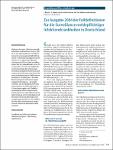Zur Ausgabe 2004 der Falldefinitionen für die Surveillance meldepflichtiger Infektionskrankheiten in Deutschland
On the 2004 edition of case definitions for the surveillance of notifiable infectious diseases in Germany
Benzler, Justus
Krause, Gérard
Mit Beginn des Jahres 2004 lösen neue Falldefinitionen des Robert Koch-Instituts (RKI) die im Jahr 2001 eingeführten Falldefinitionen ab. Die neue Ausgabe enthält Definitionen für 53 Übermittlungskategorien von Einzelfällen, die im Rahmen des Infektionsschutzgesetzes (IfSG) von den Gesundheitsämtern über die Landesbehörden an das RKI zu übermitteln sind. Die neuen Falldefinitionen berücksichtigen die fortschreitende Entwicklung der Labormethoden und durch systematische Evaluierung identifizierte Hinweise zur Verbesserung. Die Falldefinitionen bestehen aus 3 Evidenztypen—klinisches Bild, labordiagnostischer Nachweis, epidemiologische Bestätigung—, die jeweils krankheits- bzw. erregerspezifische Prüfkriterien enthalten. Aus der Kombination der 3 Evidenztypen ergeben sich 5 Falldefinitionskategorien: klinisch diagnostizierte Erkrankung, klinisch-epidemiologisch bestätigte Erkrankung, klinisch-labordiagnostisch bestätigte Erkrankung, labordiagnostisch nachgewiesene Infektion bei nicht erfülltem klinischen Bild, labordiagnostisch nachgewiesene Infektion bei unbekanntem klinischen Bild. With the beginning of the year 2004, new case definitions of the Robert Koch Institute (RKI) replace those introduced in 2001. The new edition provides definitions for 53 categories of cases that are to be reported by local health departments through state health authorities to the RKI according to the German infectious disease control act. The new case definitions take into account recent developments in laboratory methods and indications for improvement identified through systematic evaluation. The case definitions consist of three types of evidence—clinical picture, laboratory detection, and epidemiological confirmation—all of which list disease- or pathogen-specific test criteria. Combining the three evidence types results in five case definition categories: clinically diagnosed illness, clinically and epidemiologically confirmed illness, clinically and laboratory-confirmed illness, laboratory-detected infection not fulfilling clinical criteria, and laboratory-detected infection with unknown clinical picture.
No license information

